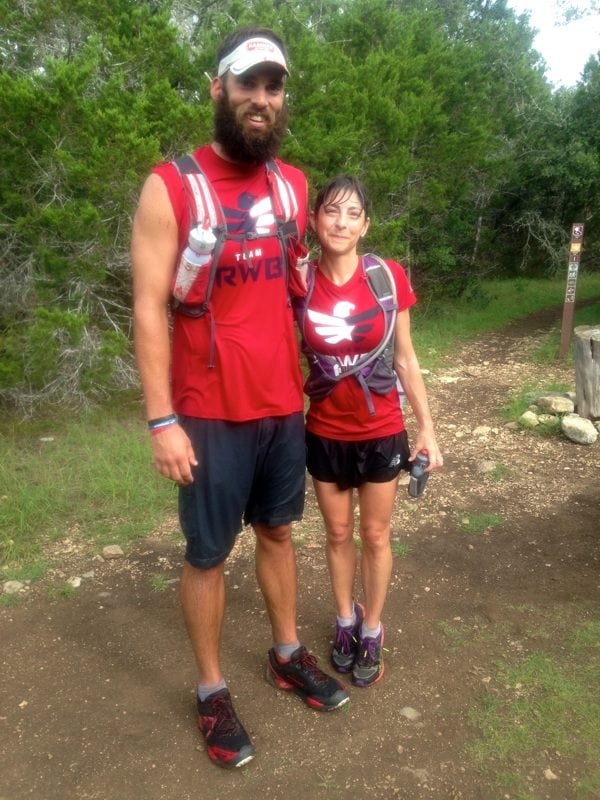From Liza:
We ultrarunners like to write race reports. We run for many, many (and many) hours, and then we sit down and write about it. Some are long. And some are short. Some are sad. And some are glad. And some are very, very bad. (Sorry, I just finished reading bedtime stories to my two year old. Honestly, though, I might have to write my next race report completely in Dr. Seuss quotes. “Here are some who like to run. They run for fun in the hot hot sun.”)

Liza and Brian Ricketts running for fun in the hot hot sun. Photo: Travis Bagwell
Certainly, we usually have more to write about than road marathoners — my friend Brian was waylaid by a moose at the Wasatch 100 one year — but I don’t think explains what drives people, — busy people, people who might not even like writing, — to sit down and type out race reports. Why not just tell the story to your running buddies on a long run? Why bother to write? And why share it on social media?
Pam, Gina and I all write race reports. We catalog our racing successes and failures, our wardrobe malfunctions, the vomit… and we tell stories about the wonderful people and wingnuts we meet. Our motivations to write overlap, but what inspires us to actually put fingers to keyboard after a long race when we could be napping or eating with both hands, is different.
From Pam:
My motivations for blogging have changed over time. Originally, I wrote primarily as a record for myself. It served as a wrap up for big events in which I had invested so much of my time and my enthusiasm. At the time my blog readership consisted of about ten close friends and sharing the race reports was an easy way to let them know how things went at my latest event.
But as I had more success in ultrarunning my blog readership grew and I realized that the reports were reaching a broader and largely anonymous group of people. I can remember when I first got into ultrarunning, I would stay up late at night pouring over every post Jamie Donaldson ever wrote, taking both inspiration and nuggets of strategy from her pages. As much as I love running, one of my main draws to ultrarunning is the “intellectual” side of the sport — figuring out training plans, nutrition, and race strategy — and so much of this I have gleaned from other people’s blogs. For the past few years, I’ve been in the position to “pay it forward” and, hopefully, write stuff that will help others trying to learn more about the complexities of ultrarunning.
My friend J.D. Roth is a professional finance blogger and someone who has given seminars on how to be an effective blogger. He stresses that in order for a blog to be successful it has to give readers something that they want. Often this is information, but entertainment and inspiration are also reasons people return to specific blogs. I got a first hand lesson in this after winning Western States in 2013 when I had the opportunity to write two posts for iRunFar. The first was a standard race report and I did my best to make it entertaining and a bit funny and it got a decent response. But the second article was a description of everything I did to get ready for the race with background information along with decisions I made on race day. It had no plot and it wasn’t exactly Pulitzer writing, but the response was astronomical and was about seven times more “popular” than my race report. This experience has definitely helped me “edit” my race reports since then, because I know that nobody cares what kind of rental car I got or that I had dinner with my Aunt Mary the night before the race. While I still like to document the parts of the race I want to remember, I try to focus on the most entertaining elements and have a few tidbits of strategy so that readers will hopefully be able to get something useful from my reports. And by doing so, I feel like I’ve been able to have a greater connection with the readers so that I am getting something in return, too.
From Gina:
For me, scribbling down a race recap serves many purposes… but mainly as a source of info for athletes interested in racing that same course.
When I have a big race on the horizon, I normally scout the web in hopes of finding a race/trip report so that I have a better idea of what to expect. Any info is usually pretty helpful. I don’t normally tune into that racer’s notes about what they ate, or the shoes they wore… etc., but, instead, how the course treated them and the strategies they used. This helps me in training and also with mental preparation.
When I write a report, I need to do it quickly after the event ends. Either on the flight home the next day, or the following night. I’m the type that will forget little (but important) details if I don’t jot them down ASAP. Also, writing soon after doesn’t only keep the memories fresh, but also allows me to write with more emotion. I enjoy pouring my heart out onto the page. I think more people can connect with you and your thoughts when they can absorb your emotions. Connecting to someone makes you more likely to listen to them, versus feeling like you’re reading advertisement on why you should do that (or not do that) race.
Besides writing recaps as references for others, I also use them for myself. I’ve got a ton of stuff going on in my head at all times (like everyone), thus can’t remember everything about my races. Looking back on recaps triggers memories and feelings I had at the event and also memories that I may not have fully indulged in per black and white letters.
Lastly, I write so that my close friends and family have an idea of what I’m doing/going through. My parents weren’t runners; the closest they came was to watching my track meets in high school and college. They are extremely supportive, but they cannot come to every event I participate in. Thus, writing a recap so that they can follow my adventures is super important to me, and them. Though we may talk about it on the phone, it is easier for me to describe my experiences through words and photos.
From Liza:
When I first started running ultras, writing about your race was an expectation in our running group. We emailed our reports to one another — or emailed excuses about why we hadn’t finished our reports. It was just part of the deal. Ultrarunners write. I liked the storytelling challenge most — trying to figure out how to convey the enormity of the experience. What words would make someone understand what I’d just gone through and what I’d seen others go through. How could I convince my mother that running 100-mile races was a good thing — that it was fun? Later, I put the reports on a blog and they became a way for me to connect to the trail running community outside of San Antonio. People seemed to like hearing about my misadventures during races and training as much as anything else. And for a while I wrote with the intention of inspiring other runners by setting the bar low. “She’s a complete mess. If she can train for and run 100 miles, I certainly can.” People have actually stopped me during runs and told me that. It’s an inspirational writing niche I’m happy to fill.
Lately, though, writing a race report is a cathartic exercise. It’s a way to process and make peace with what I experienced mentally and emotionally. Writing a structured report is a way I can tease meaning out of the experience. I still like to weave a good story, but the more I’ve raced, the more important that transference piece has become. Private journaling doesn’t accomplish that task. But the race report does — even when it’s simply a grammatically correct recount of the miles.
Call for Comments
Pam, Gina and I are curious to know what motivates you to write race reports if you do. How are they useful to you? Have your motivations changed over time? And what kind of race reports do you like to read? Put some links to the best reports you’ve read in the comments section.
And if you need a primer on how to write a good race report, check out Tim Long’s excellent and funny How to Write An Ultra Race Report.
